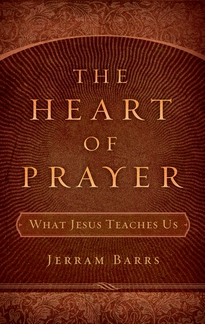Here is an excerpt taken from The Heart of Prayer: What Jesus Teaches Us by Jerram Barrs.
The Lord’s Answer
And he said to them, “When you pray, say:
“Father, hallowed be your name.
Your kingdom come.
Give us each day our daily bread,
and forgive us our sins,
for we ourselves forgive everyone who is indebted to us.
And lead us not into temptation.” (Luke 11:2–4)
In reply to their request, Jesus teaches his disciples the Lord’s Prayer. All through the centuries, this prayer has been regarded by the church both as a prayer for believers to pray and as a pattern for Christian prayer, a model for all our praying, whether public or private. What do we discover when we look at this model prayer?
A Short Prayer
We notice first that the Lord’s Prayer is a short prayer. If we time ourselves when we repeat the words that Jesus teaches us in Luke chapter 11, we will discover that it takes about fifteen seconds to say the Lord’s Prayer. On the other occasion when Jesus teaches this prayer, he reminds us that God does not hear us better when we pray long prayers (Matt. 6:7). Pagans, says Jesus, pray long prayers because they think that doing so will “make God listen better.” Jesus assures us that this is not the case. A prayer does not have to be long to be “spiritual.” It does not have to be long for God to hear it favorably. A prayer is just as powerful, just as effective, just as pleasing to the Lord if it is a short prayer.
Jesus gives another clear example of this principle in a story he tells about the prayers of a Pharisee and a tax collector (Luke 18:9–14). Jesus represents the tax collector’s prayer as very brief: “God, be merciful to me, a sinner!” (v. 13). This prayer takes just a couple of seconds, yet Jesus tells us that this man went home justified. His brief cry is a prayer that God delights to answer. Or we might think of Jesus’ prayer in the garden of Gethsemane: “My Father, if it be possible, let this cup pass from me; nevertheless, not as I will, but as you will” (Matt. 26:39); or consider his prayers from the cross: “My God, my God, why have you forsaken me?” (Mark 15:34); “Father, forgive them, for they know not what they do” (Luke 23:34); and “Father, into your hands I commit my spirit!” (Luke 23:46).
God the Father was clearly pleased with these brief prayers of his Son—the Son who had dwelt close to his heart through all eternity. In just the same way, our prayers do not have to be long for God to be pleased to hear them. In fact, if our prayers are long, we might need to ask ourselves, “Why am I praying a long prayer?”
If our answer to this question is that we feel that the length of time we pray will make God more likely to listen to us, then we are wrong in a truly deep way. God hears us because of his love for us in Christ, not because we pray prayers that someone else may regard as “spiritual” because of their length. Jesus assures us that his Father is satisfied with a prayer that lasts only half a minute, or even a fleeting instant. If we answer that it is a good spiritual discipline for us to spend a good long time at our prayers, we need to ask ourselves the question: “What is prayer? Is prayer about disciplining myself to pray long prayers, or is it about talking to the Lord?” We will come back to this question later.
We may want to respond: “Aren’t prayers occasionally very long? Isn’t it true that some of the prayers recorded in the Bible would take a much greater time to pray than the Lord’s Prayer?” We can think about some biblical examples—for instance, if we read aloud the prayer of confession that Daniel prays (Dan. 9:4–19), we will discover that it would take us perhaps five minutes to say this prayer. Or we might think of the longest of the psalms, Psalm 119, which might take twenty or thirty minutes to say aloud.
We can acknowledge that sometimes our prayers might be longer than the Lord’s Prayer; we will address the issue of length, of extended prayer times and periods of fasting, at a later place in our study. But the point we need to grasp now is this: brief prayers are pleasing to the Lord; brief prayers are heard and answered by him readily and gladly. Length is not what makes a prayer acceptable to God.
Excerpt taken from pages 15-18 of The Heart of Prayer: What Jesus Teaches Us by Jerram Barrs, copyright 2008 by P&R Publishing.


Comments